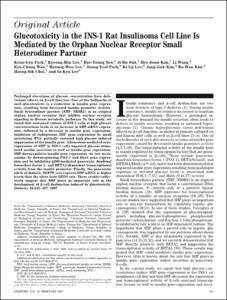KUMEL Repository
1. Journal Papers (연구논문)
1. School of Medicine (의과대학)
Dept. of Internal Medicine (내과학)
Glucotoxicity in the INS-1 Rat Insulinoma Cell Line Is Mediated by the Orphan Nuclear Receptor Small Heterodimer Partner
- Keimyung Author(s)
- Park, Keun Gyu; Kim, Hye Soon
- Department
- Dept. of Internal Medicine (내과학)
- Journal Title
- Diabetes
- Issued Date
- 2007
- Volume
- 56
- Issue
- 2
- Abstract
- Prolonged elevations of glucose concentration have deleterious
effects on -cell function. One of the hallmarks of
such glucotoxicity is a reduction in insulin gene expression,
resulting from decreased insulin promoter activity.
Small heterodimer partner (SHP; NR0B2) is an atypical
orphan nuclear receptor that inhibits nuclear receptor
signaling in diverse metabolic pathways. In this study, we
found that sustained culture of INS-1 cells at high glucose
concentrations leads to an increase in SHP mRNA expression,
followed by a decrease in insulin gene expression.
Inhibition of endogenous SHP gene expression by small
interfering RNA partially restored high-glucose–induced
suppression of the insulin gene. Adenovirus-mediated overexpression
of SHP in INS-1 cells impaired glucose-stimulated
insulin secretion as well as insulin gene expression.
SHP downregulates insulin gene expression via two mechanisms:
by downregulating PDX-1 and MafA gene expression
and by inhibiting p300-mediated pancreatic duodenal
homeobox factor 1– and BETA2-dependent transcriptional
activity from the insulin promoter. Finally, the pancreatic
islets of diabetic OLETF rats express SHP mRNA at higher
levels than the islets from LETO rats. These results collectively
suggest that SHP plays an important role in the
development of -cell dysfunction induced by glucotoxicity.
Diabetes 56:431–437, 2007
- Publisher
- School of Medicine
- Citation
- Keun-Gyu Park et al. (2007). Glucotoxicity in the INS-1 Rat Insulinoma Cell Line Is
Mediated by the Orphan Nuclear Receptor Small
Heterodimer Partner. Diabetes, 56(2), 431–437. doi: 10.2337/db06-0753
- Type
- Article
- ISSN
- 0012-1797
- Appears in Collections:
- 1. School of Medicine (의과대학) > Dept. of Internal Medicine (내과학)
- 파일 목록
-
-
Download
 oak-aaa-01599.pdf
기타 데이터 / 428.04 kB / Adobe PDF
oak-aaa-01599.pdf
기타 데이터 / 428.04 kB / Adobe PDF
-
Items in Repository are protected by copyright, with all rights reserved, unless otherwise indicated.